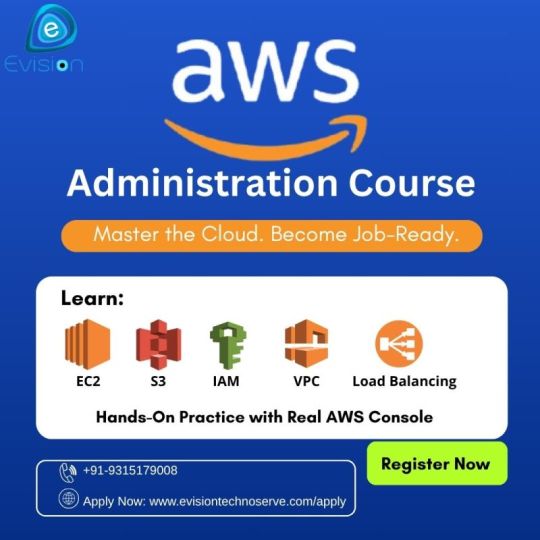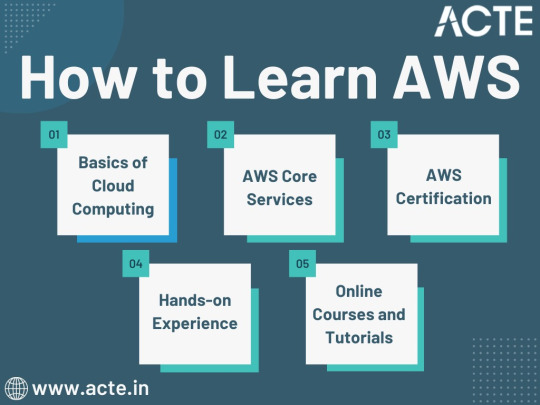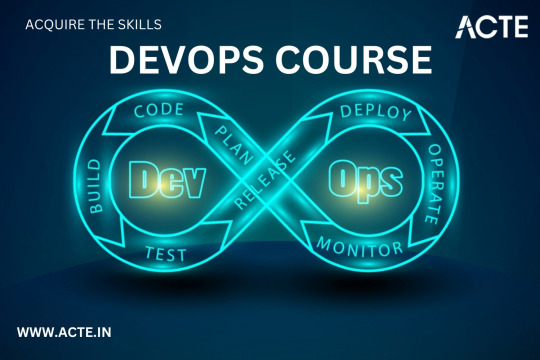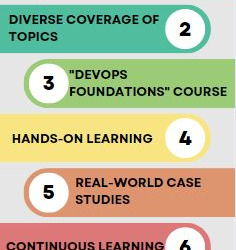#AWS Cloud Practitioner Course
Explore tagged Tumblr posts
Text

Launch Cloud Career with AWS - Join AWS Administration Course - Evision Technoserve
Join our comprehensive AWS Administration Course and build real-world skills with hands-on practice using the AWS Console. Learn essential cloud services like EC2, S3, IAM, VPC, and Load Balancing to become job-ready for a career in the cloud industry. This job-oriented training is designed to help you master cloud computing and gain the confidence to pursue top IT roles. Upskill with practical experience and industry-relevant knowledge.
#AWS Online Course with Certification#AWS Cloud Administration Training#Learn AWS from Scratch#AWS Cloud Practitioner Course#AWS Training and Certification#AWS Administration Course
0 notes
Text
AWS Cloud Practitioner Pass Rate
The AWS Cloud Practitioner certification has a high pass rate, making it an ideal entry-level credential for beginners in cloud computing. It tests foundational AWS knowledge, covering cloud concepts, security, pricing, and services. With proper study materials and hands-on practice, candidates can successfully clear the exam and kickstart their cloud career with AWS certification.
0 notes
Text
What is the AWS Certified Solutions Architect – Associate?
Cloud-based technologies, like Cloud Architecture, play a pivotal role in driving innovation and efficiency in businesses. With more and more organizations migrating to cloud, the requirement of qualified professionals in the domain has been at an all-time high.

The AWS Certified Solutions Architect - Associate is a certification of expertise for an individual in AWS Cloud services, particularly on architecting solutions that are high-performing, resilient and cost efficient at the same time. With this certification, any aspiring cloud professional can become employment-ready and land a well-paying job in a cloud-based organization. Let us take a look at the details of the certification and how to achieve it.
A Brief Outline Of The AWS Certified Solutions Architect – Associate
AWS Certified Solutions Architect - Associate certification focuses on skill development in solutions that are optimal in cost and performance. An individual with this certification would display an in-depth understanding of the AWS Well-Architected Framework. The certification validates the individual’s ability to design and implement solutions over a variety of AWS services like EC2, S3, RDS, and VPC to meet a variety of business motives.
The certification further enhances the portfolio of learners and increases their credibility and confidence when seeking employment in the domain. They develop expertise to select the apt AWS services for specified use cases, and understand the best practices concerning AWS architecture.
What Is The AWS Certified Solutions Architect - Associate exam?
For achieving the AWS Certified Solutions Architect - Associate certification, candidates need to successfully pass an examination testing their abilities to design and deploy reliable AWS solutions. It is the AWS Certified Solutions Architect - Associate (SAA-C03) examination, which validates a candidate’s ability to design solutions based on the AWS Well-Architected Framework.
This associate-level exam judges the candidates’ knowledge of architectural principles, AWS services, and best practices for designing solutions based on the cloud. The exam covers a range of topics related to cloud computing, including performance optimization, security implementation, and designing resilient architectures over AWS. Here are its specifications: -
Level: Associate
Length: 130 minutes
Cost: 150 USD
Format: 65 questions, multiple choice or multiple response
Delivery method: Pearson VUE testing center or online proctored exam
Points To Keep In Mind Prior To Taking Up The Certification
While there are numerous benefits one can expect from achieving the AWS Certified Solutions Architect - Associate certification, there are also a few points to consider prior to taking up the certification exam. These points are mentioned underneath: -
Who is the certification meant for?
The AWS Certified Solutions Architect – Associate certification is ideal for professionals with: -
Experience in AWS technology
Strong understanding of on-premises IT infrastructure
Familiarity with mapping on-premises to cloud
Experience with other cloud services
Prerequisites for the Certification
While hands-on coding experience is not mandatory for taking up the exam, candidates should have a solid understanding of basic programming concepts and AWS services. Familiarity with AWS Cloud Practitioner Essentials or AWS Technical Essentials is also recommend.
Be A Certified Solutions Architect With Cloud Wizard’s Authorized Training & Certification Courses
Passing the AWS Certified Solutions Architect - Associate Exam is certainly a milestone for an aspiring cloud professional’s career. However, it requires rigorous training and guidance on the concepts of Architecting on AWS. Getting in touch with an Advanced Tier Training Partner like Cloud Wizard can benefit you in a lot of ways.
With lots of classroom training programs for a number of Cloud-based certifications provided by AWS, you will be well-versed with each and every topic prior to the certification exam. Additionally, they provide specialized exam readiness training sessions so you can be a certified cloud professional in no time!
Want to explore further? Take a look at more AWS Certifications
0 notes
Text




03.03.2025
Life is getting better.
After so many days in the hospital, my husband is very well, I am studying and exercising again... It feels like a rebirth 🐦🔥
I will start my new job this month, working with vulnerabilities (awareness, understanding root cases, extracting data from the management tools of the company, work closer to other internal Cybersecurity teams to help the department developers). I am not afraid, not because I am extremely courageous, but couldn't think about that until now 😄 the hospital situation was taking my whole time and effort.
I will continue my Ethical Hacker course with Cisco and started the AWS Cloud practitioner certification studies to get this one and the AI at least until July.
Thank God one phase is over! Let's to energize and go to the next one (a better one, I hope, 'cause I had enough hardcore mode in this first two months of 2025).
🌼 have a great week, guys!
#studyblr#study#study blog#daily life#dailymotivation#study motivation#studying#study space#productivity#study desk
31 notes
·
View notes
Text
Exploring DeepSeek and the Best AI Certifications to Boost Your Career
Understanding DeepSeek: A Rising AI Powerhouse
DeepSeek is an emerging player in the artificial intelligence (AI) landscape, specializing in large language models (LLMs) and cutting-edge AI research. As a significant competitor to OpenAI, Google DeepMind, and Anthropic, DeepSeek is pushing the boundaries of AI by developing powerful models tailored for natural language processing, generative AI, and real-world business applications.
With the AI revolution reshaping industries, professionals and students alike must stay ahead by acquiring recognized certifications that validate their skills and knowledge in AI, machine learning, and data science.
Why AI Certifications Matter
AI certifications offer several advantages, such as:
Enhanced Career Opportunities: Certifications validate your expertise and make you more attractive to employers.
Skill Development: Structured courses ensure you gain hands-on experience with AI tools and frameworks.
Higher Salary Potential: AI professionals with recognized certifications often command higher salaries than non-certified peers.
Networking Opportunities: Many AI certification programs connect you with industry experts and like-minded professionals.
Top AI Certifications to Consider
If you are looking to break into AI or upskill, consider the following AI certifications:
1. AICerts – AI Certification Authority
AICerts is a recognized certification body specializing in AI, machine learning, and data science.
It offers industry-recognized credentials that validate your AI proficiency.
Suitable for both beginners and advanced professionals.
2. Google Professional Machine Learning Engineer
Offered by Google Cloud, this certification demonstrates expertise in designing, building, and productionizing machine learning models.
Best for those who work with TensorFlow and Google Cloud AI tools.
3. IBM AI Engineering Professional Certificate
Covers deep learning, machine learning, and AI concepts.
Hands-on projects with TensorFlow, PyTorch, and SciKit-Learn.
4. Microsoft Certified: Azure AI Engineer Associate
Designed for professionals using Azure AI services to develop AI solutions.
Covers cognitive services, machine learning models, and NLP applications.
5. DeepLearning.AI TensorFlow Developer Certificate
Best for those looking to specialize in TensorFlow-based AI development.
Ideal for deep learning practitioners.
6. AWS Certified Machine Learning – Specialty
Focuses on AI and ML applications in AWS environments.
Includes model tuning, data engineering, and deep learning concepts.
7. MIT Professional Certificate in Machine Learning & Artificial Intelligence
A rigorous program by MIT covering AI fundamentals, neural networks, and deep learning.
Ideal for professionals aiming for academic and research-based AI careers.
Choosing the Right AI Certification
Selecting the right certification depends on your career goals, experience level, and preferred AI ecosystem (Google Cloud, AWS, or Azure). If you are a beginner, starting with AICerts, IBM, or DeepLearning.AI is recommended. For professionals looking for specialization, cloud-based AI certifications like Google, AWS, or Microsoft are ideal.
With AI shaping the future, staying certified and skilled will give you a competitive edge in the job market. Invest in your learning today and take your AI career to the next leve
3 notes
·
View notes
Text
How to Become a Cloud Computing Engineer
Introduction:
Cloud computing has become a cornerstone of modern IT infrastructure, making the role of a Cloud Computing Engineer highly in demand. If you're looking to enter this field, here's a roadmap to help you get started:
Build a Strong Foundation in IT A solid understanding of computer networks, operating systems, and basic programming is essential. Consider getting a degree in Computer Science or Information Technology. Alternatively, Jetking offer you to make your career in Cloud computing Courses and gain the technical knowledge needed.
Learn Cloud Platforms Familiarize yourself with popular cloud service providers such as AWS (Amazon Web Services), Microsoft Azure, and Google Cloud. Many platforms offer certification courses, like AWS Certified Solutions Architect, which will help validate your skills.
Gain Hands-On Experience Practical experience is critical. Set up your own cloud projects, manage databases, configure servers, and practice deploying applications. This will give you the real-world experience that employers seek.
Master Programming Languages Learn programming languages commonly used in cloud environments, such as Python, Java, or Ruby. Scripting helps automate tasks, making your work as a cloud engineer more efficient.
Understand Security in the Cloud Security is paramount in cloud computing. Gain knowledge of cloud security best practices, such as encryption, data protection, and compliance standards to ensure safe operations and become Master in cloud computing courses.
Get Certified Earning cloud certifications from AWS, Azure, or Google Cloud can enhance your credibility. Certifications like AWS Certified Cloud Practitioner or Microsoft Certified: Azure Fundamentals can provide you a competitive edge.
Keep Learning Cloud technology evolves rapidly, so continuous learning is key. Stay updated by taking advanced courses and attending cloud tech conferences.
Join Jetking today! Click Here
By building your expertise in these areas, you’ll be well on your way to a successful career as a Cloud Computing Engineer!
2 notes
·
View notes
Text
Journey to AWS Proficiency: Unveiling Core Services and Certification Paths
Amazon Web Services, often referred to as AWS, stands at the forefront of cloud technology and has revolutionized the way businesses and individuals leverage the power of the cloud. This blog serves as your comprehensive guide to understanding AWS, exploring its core services, and learning how to master this dynamic platform. From the fundamentals of cloud computing to the hands-on experience of AWS services, we'll cover it all. Additionally, we'll discuss the role of education and training, specifically highlighting the value of ACTE Technologies in nurturing your AWS skills, concluding with a mention of their AWS courses.

The Journey to AWS Proficiency:
1. Basics of Cloud Computing:
Getting Started: Before diving into AWS, it's crucial to understand the fundamentals of cloud computing. Begin by exploring the three primary service models: Infrastructure as a Service (IaaS), Platform as a Service (PaaS), and Software as a Service (SaaS). Gain a clear understanding of what cloud computing is and how it's transforming the IT landscape.
Key Concepts: Delve into the key concepts and advantages of cloud computing, such as scalability, flexibility, cost-effectiveness, and disaster recovery. Simultaneously, explore the potential challenges and drawbacks to get a comprehensive view of cloud technology.
2. AWS Core Services:
Elastic Compute Cloud (EC2): Start your AWS journey with Amazon EC2, which provides resizable compute capacity in the cloud. Learn how to create virtual servers, known as instances, and configure them to your specifications. Gain an understanding of the different instance types and how to deploy applications on EC2.
Simple Storage Service (S3): Explore Amazon S3, a secure and scalable storage service. Discover how to create buckets to store data and objects, configure permissions, and access data using a web interface or APIs.
Relational Database Service (RDS): Understand the importance of databases in cloud applications. Amazon RDS simplifies database management and maintenance. Learn how to set up, manage, and optimize RDS instances for your applications. Dive into database engines like MySQL, PostgreSQL, and more.
3. AWS Certification:
Certification Paths: AWS offers a range of certifications for cloud professionals, from foundational to professional levels. Consider enrolling in certification courses to validate your knowledge and expertise in AWS. AWS Certified Cloud Practitioner, AWS Certified Solutions Architect, and AWS Certified DevOps Engineer are some of the popular certifications to pursue.
Preparation: To prepare for AWS certifications, explore recommended study materials, practice exams, and official AWS training. ACTE Technologies, a reputable training institution, offers AWS certification training programs that can boost your confidence and readiness for the exams.
4. Hands-on Experience:
AWS Free Tier: Register for an AWS account and take advantage of the AWS Free Tier, which offers limited free access to various AWS services for 12 months. Practice creating instances, setting up S3 buckets, and exploring other services within the free tier. This hands-on experience is invaluable in gaining practical skills.
5. Online Courses and Tutorials:
Learning Platforms: Explore online learning platforms like Coursera, edX, Udemy, and LinkedIn Learning. These platforms offer a wide range of AWS courses taught by industry experts. They cover various AWS services, architecture, security, and best practices.
Official AWS Resources: AWS provides extensive online documentation, whitepapers, and tutorials. Their website is a goldmine of information for those looking to learn more about specific AWS services and how to use them effectively.

Amazon Web Services (AWS) represents an exciting frontier in the realm of cloud computing. As businesses and individuals increasingly rely on the cloud for innovation and scalability, AWS stands as a pivotal platform. The journey to AWS proficiency involves grasping fundamental cloud concepts, exploring core services, obtaining certifications, and acquiring practical experience. To expedite this process, online courses, tutorials, and structured training from renowned institutions like ACTE Technologies can be invaluable. ACTE Technologies' comprehensive AWS training programs provide hands-on experience, making your quest to master AWS more efficient and positioning you for a successful career in cloud technology.
8 notes
·
View notes
Text
Journey to Devops
The concept of “DevOps” has been gaining traction in the IT sector for a couple of years. It involves promoting teamwork and interaction, between software developers and IT operations groups to enhance the speed and reliability of software delivery. This strategy has become widely accepted as companies strive to provide software to meet customer needs and maintain an edge, in the industry. In this article we will explore the elements of becoming a DevOps Engineer.
Step 1: Get familiar with the basics of Software Development and IT Operations:
In order to pursue a career as a DevOps Engineer it is crucial to possess a grasp of software development and IT operations. Familiarity with programming languages like Python, Java, Ruby or PHP is essential. Additionally, having knowledge about operating systems, databases and networking is vital.
Step 2: Learn the principles of DevOps:
It is crucial to comprehend and apply the principles of DevOps. Automation, continuous integration, continuous deployment and continuous monitoring are aspects that need to be understood and implemented. It is vital to learn how these principles function and how to carry them out efficiently.
Step 3: Familiarize yourself with the DevOps toolchain:
Git: Git, a distributed version control system is extensively utilized by DevOps teams, for code repository management. It aids in monitoring code alterations facilitating collaboration, among team members and preserving a record of modifications made to the codebase.
Ansible: Ansible is an open source tool used for managing configurations deploying applications and automating tasks. It simplifies infrastructure management. Saves time when performing tasks.
Docker: Docker, on the other hand is a platform for containerization that allows DevOps engineers to bundle applications and dependencies into containers. This ensures consistency and compatibility across environments from development, to production.
Kubernetes: Kubernetes is an open-source container orchestration platform that helps manage and scale containers. It helps automate the deployment, scaling, and management of applications and micro-services.
Jenkins: Jenkins is an open-source automation server that helps automate the process of building, testing, and deploying software. It helps to automate repetitive tasks and improve the speed and efficiency of the software delivery process.
Nagios: Nagios is an open-source monitoring tool that helps us monitor the health and performance of our IT infrastructure. It also helps us to identify and resolve issues in real-time and ensure the high availability and reliability of IT systems as well.
Terraform: Terraform is an infrastructure as code (IAC) tool that helps manage and provision IT infrastructure. It helps us automate the process of provisioning and configuring IT resources and ensures consistency between development and production environments.
Step 4: Gain practical experience:
The best way to gain practical experience is by working on real projects and bootcamps. You can start by contributing to open-source projects or participating in coding challenges and hackathons. You can also attend workshops and online courses to improve your skills.
Step 5: Get certified:
Getting certified in DevOps can help you stand out from the crowd and showcase your expertise to various people. Some of the most popular certifications are:
Certified Kubernetes Administrator (CKA)
AWS Certified DevOps Engineer
Microsoft Certified: Azure DevOps Engineer Expert
AWS Certified Cloud Practitioner
Step 6: Build a strong professional network:
Networking is one of the most important parts of becoming a DevOps Engineer. You can join online communities, attend conferences, join webinars and connect with other professionals in the field. This will help you stay up-to-date with the latest developments and also help you find job opportunities and success.
Conclusion:
You can start your journey towards a successful career in DevOps. The most important thing is to be passionate about your work and continuously learn and improve your skills. With the right skills, experience, and network, you can achieve great success in this field and earn valuable experience.
2 notes
·
View notes
Text
Level Up Your Software Development Skills: Join Our Unique DevOps Course
Would you like to increase your knowledge of software development? Look no further! Our unique DevOps course is the perfect opportunity to upgrade your skillset and pave the way for accelerated career growth in the tech industry. In this article, we will explore the key components of our course, reasons why you should choose it, the remarkable placement opportunities it offers, and the numerous benefits you can expect to gain from joining us.

Key Components of Our DevOps Course
Our DevOps course is meticulously designed to provide you with a comprehensive understanding of the DevOps methodology and equip you with the necessary tools and techniques to excel in the field. Here are the key components you can expect to delve into during the course:
1. Understanding DevOps Fundamentals
Learn the core principles and concepts of DevOps, including continuous integration, continuous delivery, infrastructure automation, and collaboration techniques. Gain insights into how DevOps practices can enhance software development efficiency and communication within cross-functional teams.
2. Mastering Cloud Computing Technologies
Immerse yourself in cloud computing platforms like Amazon Web Services (AWS), Microsoft Azure, and Google Cloud Platform. Acquire hands-on experience in deploying applications, managing serverless architectures, and leveraging containerization technologies such as Docker and Kubernetes for scalable and efficient deployment.
3. Automating Infrastructure as Code
Discover the power of infrastructure automation through tools like Ansible, Terraform, and Puppet. Automate the provisioning, configuration, and management of infrastructure resources, enabling rapid scalability, agility, and error-free deployments.
4. Monitoring and Performance Optimization
Explore various monitoring and observability tools, including Elasticsearch, Grafana, and Prometheus, to ensure your applications are running smoothly and performing optimally. Learn how to diagnose and resolve performance bottlenecks, conduct efficient log analysis, and implement effective alerting mechanisms.
5. Embracing Continuous Integration and Delivery
Dive into the world of continuous integration and delivery (CI/CD) pipelines using popular tools like Jenkins, GitLab CI/CD, and CircleCI. Gain a deep understanding of how to automate build processes, run tests, and deploy applications seamlessly to achieve faster and more reliable software releases.
Reasons to Choose Our DevOps Course
There are numerous reasons why our DevOps course stands out from the rest. Here are some compelling factors that make it the ideal choice for aspiring software developers:
Expert Instructors: Learn from industry professionals who possess extensive experience in the field of DevOps and have a genuine passion for teaching. Benefit from their wealth of knowledge and practical insights gained from working on real-world projects.
Hands-On Approach: Our course emphasizes hands-on learning to ensure you develop the practical skills necessary to thrive in a DevOps environment. Through immersive lab sessions, you will have opportunities to apply the concepts learned and gain valuable experience working with industry-standard tools and technologies.
Tailored Curriculum: We understand that every learner is unique, so our curriculum is strategically designed to cater to individuals of varying proficiency levels. Whether you are a beginner or an experienced professional, our course will be tailored to suit your needs and help you achieve your desired goals.
Industry-Relevant Projects: Gain practical exposure to real-world scenarios by working on industry-relevant projects. Apply your newly acquired skills to solve complex problems and build innovative solutions that mirror the challenges faced by DevOps practitioners in the industry today.

Benefits of Joining Our DevOps Course
By joining our DevOps course, you open up a world of benefits that will enhance your software development career. Here are some notable advantages you can expect to gain:
Enhanced Employability: Acquire sought-after skills that are in high demand in the software development industry. Stand out from the crowd and increase your employability prospects by showcasing your proficiency in DevOps methodologies and tools.
Higher Earning Potential: With the rise of DevOps practices, organizations are willing to offer competitive remuneration packages to skilled professionals. By mastering DevOps through our course, you can significantly increase your earning potential in the tech industry.
Streamlined Software Development Processes: Gain the ability to streamline software development workflows by effectively integrating development and operations. With DevOps expertise, you will be capable of accelerating software deployment, reducing errors, and improving the overall efficiency of the development lifecycle.
Continuous Learning and Growth: DevOps is a rapidly evolving field, and by joining our course, you become a part of a community committed to continuous learning and growth. Stay updated with the latest industry trends, technologies, and best practices to ensure your skills remain relevant in an ever-changing tech landscape.
In conclusion, our unique DevOps course at ACTE institute offers unparalleled opportunities for software developers to level up their skills and propel their careers forward. With a comprehensive curriculum, remarkable placement opportunities, and a host of benefits, joining our course is undoubtedly a wise investment in your future success. Don't miss out on this incredible chance to become a proficient DevOps practitioner and unlock new horizons in the world of software development. Enroll today and embark on an exciting journey towards professional growth and achievement!
10 notes
·
View notes
Text
What Are the Career Benefits of Taking an AWS Course in Pune?
1. High Demand—Especially in Pune’s Tech Scene
AWS skills are among the most sought-after globally, and Pune is no exception. As one of India’s fastest-growing IT hubs, Pune hosts numerous IT parks and companies actively seeking cloud‑capable talent. Bengaluru and Hyderabad are often highlighted as major tech centres but Pune is right up there, offering growing opportunity for AWS professionals Industry reports confirm that demand for AWS expertise consistently exceeds supply in India and beyond. For learners, this means AWS Course in Pune is a ticket into a thriving job market.
2. Higher Salary Potential
Across India, AWS-certified professionals command impressive pay scales. Entry-level roles such as Cloud Practitioner or Solutions Architect often start around ₹6–8 LPA, while professional or specialty holders can earn ₹10–12 LPA or more. Many sources report certified individuals earn 25% or more than their non‑certified peers which translates into significant lifetime income gains. And since Pune-based IT companies typically match or exceed national standards, AWS skills directly translate into better salary offers locally.
3. Real Learning—Technical Proficiency
Too often folks focus on certificates as checkboxes but real value comes from actual learning. AWS certification exams require hands-on experience with EC2, S3, RDS, IAM, Lambda, VPC, auto-scaling, and more. Through structured coursework and practice labs, learners become confident problem‑solvers.
4. Access to Multiple Career Tracks
With AWS skills you’re never limited. Certification opens doors to roles like:
Cloud Engineer / AWS Engineer
Solutions Architect (Associate‑level or Professional)
DevOps Engineer
SysOps Administrator
Cloud Security Specialist
Machine Learning or Networking Specialist
Whether you’re a fresh graduate or a mid‑career IT pro, you can pick a track aligned to your strengths and ambitions. As your experience and certifications grow, roles and pay scale scale up accordingly.
5. Career Advancement & Recognition
Within organizations, having an AWS cert often leads to faster promotions, increased responsibilities, and recognition from leadership. One Reddit user noted they were told:
AWS certifications signal commitment and expertise and many employers reward that with leadership or strategic project roles.
6. Community & Networks—Both Local and Global
Enrolling in an AWS course in Pune typically connects you with a local student cohort and often local AWS community meetups or user groups. Beyond Pune, AWS certification grants access to a global network of certified professionals, official LinkedIn groups, AWS forums, and exclusive events. These connections boost visibility, open up mentorship opportunities, and lead you to jobs or projects you might not discover otherwise.
7. Credibility That Employers Trust
An AWS badge on your résumé immediately earns trust. Many hiring managers—especially at AWS partner firms make certification a prerequisite or strong preference in cloud-related job listings Formal AWS certification shows employers you have verifiable knowledge—not just self‑claimed skills. It instills confidence in your ability to deploy and manage cloud infra responsibly.
8. Freelance & Consulting Opportunities
Being AWS certified opens doors beyond traditional employment. In Pune’s growing gig economy, many freelancers secure projects as cloud consultants or AWS specialists. Their digital badge becomes a trust signal to clients Freelancers report charging ₹2,000–4,000/hour depending on experience and certification level (particularly as Cloud Practitioners or Associate professionals)
9. Long‑Term Learning: Staying Relevant
AWS is constantly evolving new services regularly roll out, and best practices shift. Maintaining certification means staying current, as AWS recertification requires refreshers and learning new features or services This ensures your knowledge stays sharp, marketable, and aligned with needs of employers and the industry.
Why Pune Is the Right Place to Learn AWS
Pune has a mix of large IT firms, MNCs, startups, and educational institutions. Companies like Capgemini, Tech Mahindra, Persistent Systems, Infosys and others have operations there and many actively seek cloud‑skilled professionals. Moreover, Pune has emerging startup clusters and fintech firms increasingly adopting AWS to scale securely. Taking an AWS course at UV Technocrats locally gives you a geographic edge faster access to networking events, interview opportunities, and local placement programs.
Real Voices: What Learners Say
“I got the job because I had an AWS SAA certification. For AWS Pro certifications, they pay a bonus for just getting the cert.
“Studying for a certification gave me exposure helped me get my next job.
Final Thought
So, what are the career benefits of taking an AWS course in Pune? In one word: empowerment. You’ll gain in-demand technical proficiency, build credibility with employers, unlock diverse career opportunities, network with a community of professionals, and significantly boost your earning power. All of this plays out within Pune’s growing technology ecosystem making it a smart, strategic investment in your future.
0 notes
Text
What is the Machine Learning Certification on AWS?

Machine Learning has been a crucial part of driving innovation and optimization of businesses in the digital landscape. There is no doubt that ML is a field with enormous potential to catapult careers in this day and age.
But to make an impact with hiring managers, the ML enthusiasts need to be more than just aware of the basics of ML concepts. They need to have adequate skills to build, train, and deploy ML models. The Machine Learning Certification On AWS can be of great assistance in validating these skills. Let's take a look at what the certification is all about and how to achieve it.
Machine Learning Certification On AWS - An Overview
The Machine Learning Certification On AWS is a badge of expertise for a learner’s ability to build, train, tune, and deploy ML models on AWS. It validates the skill of working with basic ML algorithms, following model-training, deployment and operational best practices.
The certification is designed for people who perform development or data science roles. At least one year of experience in developing, architecting or running ML/deep learning workloads in AWS Cloud is recommended. For earning the certification, candidates need to successfully complete the AWS Certified Machine Learning - Specialty Exam (MLS-C01).
What is the AWS Certified Machine Learning – Specialty Exam?
The AWS Certified Machine Learning - Specialty Exam is important for becoming a certified ML professional. It validates your knowledge and ability to design, implement, deploy, and maintain Machine Learning (ML) solutions for real-world business problems. It focuses on certain topics that include data engineering, exploratory data analysis, modeling, and ML implementation and operations. The exam stresses on applying knowledge on practical scenarios, thus making candidates employment-ready.
Duration of the exam - 180 minutes
Number of Questions - 65 (50 scored, 15 unscored)
Question types - Multiple choice and Multiple response questions
Price - 300 USD
Things to Consider Before Taking Up the Certification
While the Machine Learning Certification on AWS is extremely helpful in getting good employment opportunities in the field of ML, there are still a few things one needs to consider before finalizing on taking up the exam. These are mentioned as follows: -
Candidate Prerequisites
It is recommended that a candidate should have a solid foundation in ML concepts and AWS Cloud infrastructure, with at least 1-2 years of experience in developing, architecting, or executing ML on AWS. A good hold on Python programming and familiarity with services provided by AWS like Amazon CloudWatch or S3 is a plus.
Required Knowledge
Before enrolling in the certification course, it's essential to have a good understanding of ML algorithms, hyperparameter optimization, and the machine learning pipeline. Proficiency in expressing the intuition behind ML algorithms, experience with ML and deep learning frameworks, and knowledge of model training, deployment, and operational best practices are key to success.
Ready to become a certified ML Professional? Enroll yourself into the exam right here!
Benefits of Achieving the Machine Learning Certification On AWS
The Machine Learning Certification on AWS can be beneficial for professional growth and enrichment of skill sets in more ways than one. Here are a few ways in which the certification can be of great value to a candidate: -
Unlock New Career Opportunities
Certified professionals are in high demand across industries, from finance to healthcare, where ML-driven insights are transforming business operations.
Gain Recognition and Credibility
The AWS Certified Machine Learning – Specialty credential demonstrates a candidate’s excellence in ML on the AWS platform. This certification is recognized globally as a mark of professionalism.
Expand Your Skill Set
With this certification, one can learn to design scalable, cost-optimized, and secure ML pipelines on AWS, enhancing your capabilities as an ML practitioner.
Access Exclusive Benefits
Upon certification, the learner shall gain access to a range of exclusive benefits. Upon showcasing achievement with digital badges on social media and email signatures, the candidate receives a 50% discount voucher for re-certification or any other exam as well as invites to regional Appreciation Receptions and exclusive access to AWS Certification Lounges at events.
Be an AWS Certified Machine Learning Professional With Cloud Wizard
To successfully get the Machine Learning Certification On AWS, partnering with an Advanced Tier Training Partner can make a good difference. Cloud Wizard offers comprehensive training programs for a number of Cloud-based certifications provided by AWS. Their authorized training platform provides rigorous classroom courses, specialized exam readiness training sessions, and expert guidance to help you ace the certification.
Cloud Wizard's AWS Training & Certification courses are your pathway to success. Check out our AWS certification they offer right here!
1 note
·
View note
Text
0 notes
Text
#aws #cloudcomputing #cloud #devops #azure #technology #python #awscloud #cybersecurity
#amazonwebservices #linux #coding #software #kubernetes #datascience #developer #tech
#java #programming #bigdata #it #docker #machinelearning
0 notes
Text
#aws #cloudcomputing #cloud #devops #azure #technology #python #awscloud #cybersecurity
#amazonwebservices #linux #coding #software #kubernetes #datascience #developer #tech
#java #programming #bigdata #it #docker #machinelearning
0 notes
Text
#aws #cloudcomputing #cloud #devops #azure #technology #python #awscloud #cybersecurity
#amazonwebservices #linux #coding #software #kubernetes #datascience #developer #tech
#java #programming #bigdata #it #docker #machinelearning
0 notes
Text
#aws #cloudcomputing #cloud #devops #azure #technology #python #awscloud #cybersecurity
#amazonwebservices #linux #coding #software #kubernetes #datascience #developer #tech
#java #programming #bigdata #it #docker #machinelearning
0 notes